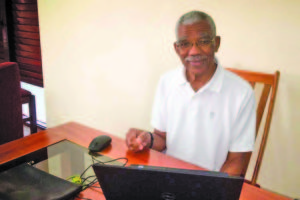
… expected to make full recovery following cancer diagnosis
President David Granger has been diagnosed with cancer and will undergo chemotherapy in Cuba. This was confirmed in a statement issued by the Embassy of Guyana in Cuba late Wednesday.
The President left with his wife, First Lady Sandra Granger for Cuba around two weeks ago.
A statement issued by the Ministry of the Presidency on October 29, 2018, confirmed his travel. It said that the President and the First Lady will spend one week in Cuba.
Subsequently, another update was provided by the Government which stated that Granger, 73, was resting comfortably at an official residence in Cuba following an intensive series of tests by specialist doctors.
According to the statement, he was receiving treatment at the Centro de Investigaciones Medico Quirugicas (CIMEQ) in Havana. At that time, clinical analyses were still incomplete.
“The Head of State has responded satisfactorily to medical interventions over the past week… and is recovering well. President Granger wishes to assure all citizens that he is receiving the best possible medical advice and attention. The President wishes to thank Guyanese for their expressions of concern,” the statement said.
However, suspicions were raised when the President and his wife did not return for the Local Government Elections (LGE). It was confirmed that he was not given clearance by his doctor to travel.
Deputy Director of Press Affairs at the Ministry of the Presidency, Ariana Gordon, was reported in the press as saying that the President would not have been back in time for LGEs.
Diagnoses
However, on Wednesday, the Guyana Embassy in Cuba confirmed that President Granger was diagnosed with non-Hodgkin’s lymphoma, which is a type of cancer that develops in the lymphatic system.
The lymphatic system is part of your immune system. Clear fluid, called lymph, flows through the lymphatic vessels and contains infection-fighting white blood cells, known as lymphocytes.
The statement said that on Tuesday, November 6, 2018, the President, was discharged from CIMEQ and returned to his official accommodation.
“The President’s medical personnel have now begun the second phase of treatment today, (Wednesday) and he is likely to be placed in CIMEQ for a short period of two to three days,” the statement added. He has already undergone a surgical procedure.
During this time, the Embassy said the President has been working and resting in accordance with the advice he has been receiving from his doctors. It said, “He is in fine form and a good frame of mind. He is expected to fully recover under the supervision of his doctors.”
The statement also stated that the President extended his deep gratitude to Guyanese at home and in the Diaspora, to the various Prime Ministers and Presidents, to the Caribbean Community Diplomatic Caucus in Cuba, to his friends and colleagues, and all those who sent their best wishes for his full and complete recovery.
“Above all, the President would like to publicly thank the President of the Republic of Cuba, the Government of Cuba, and the medical staff of CIMEQ for the special care and attention he has received while in Havana; and, indeed, for the excellent facilities in which he is being accommodated.”
The Embassy promised to issue another statement prior to his departure from Cuba.
In May of this year, Granger and the First Lady had travelled to Trinidad and Tobago to undergo what was referred to as their annual medical check-up.
At the time, and in response to reports in the press, the Government had revealed that the couple did their examinations under a Caribbean medical insurance scheme at the Good Health Medical Centre. Those results, Government had said, indicated a clean bill of health.
According to WebMD, non-Hodgkin’s lymphoma is cancer that starts in your body’s lymph system. Lymphoma occurs when the lymph node cells or the lymphocytes begin to multiply uncontrollably, producing cancerous cells that have the abnormal capacity to invade other tissues throughout the body.
WebMD states that the two main types of lymphoma are Hodgkin’s lymphoma and non-Hodgkin’s lymphoma. Non-Hodgkin’s lymphoma is further classified into a variety of subtypes based on the cell of origin (B-cell or T-cell), and the cell characteristics. The subtype of Non-Hodgkin’s lymphoma predicts the necessity of early treatment, the response to treatment, the type of treatment required, and the prognosis. The risk of developing non-Hodgkin’s lymphoma increases with age.



